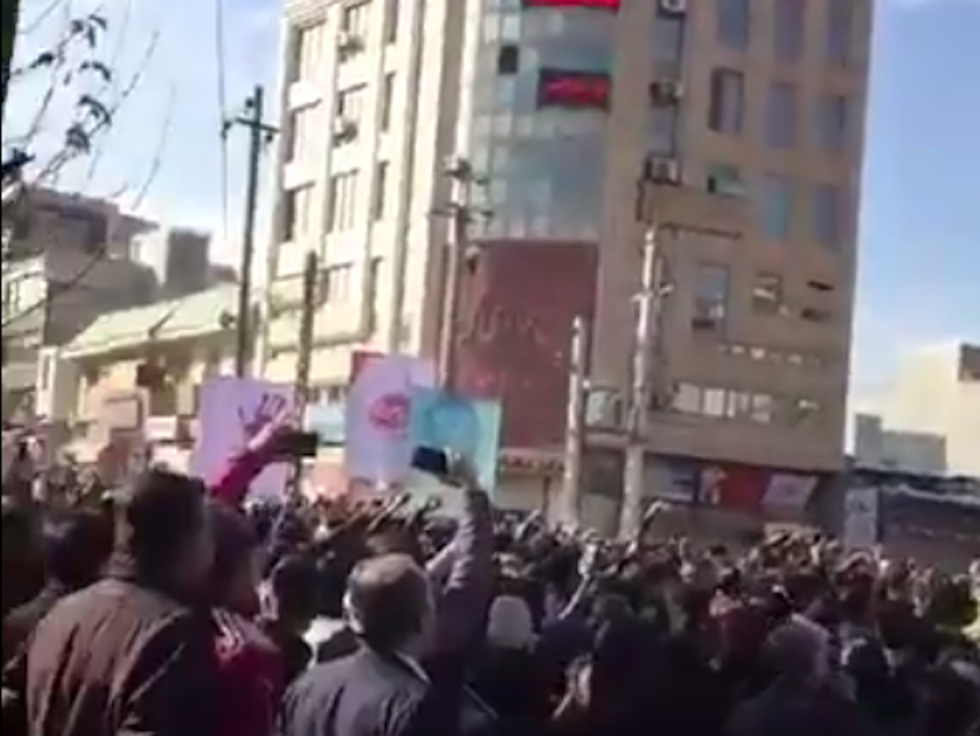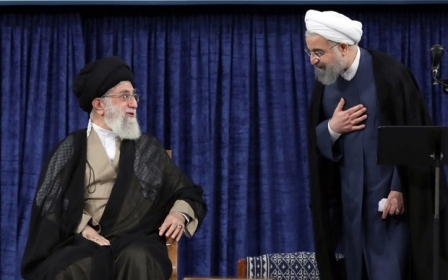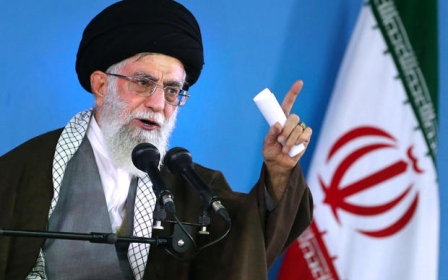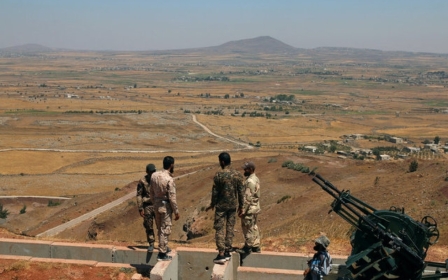Anti-government protests spread across Iran, as 52 arrested

Iranian riot police dispersed protesters shouting anti-government slogans in the western city of Kermanshah on Friday, as protests against corruption and rising prices spread to the capital Tehran.
The outbreak of regional unrest reflects growing discontent with the government, as well as concern over the Islamic republic's costly involvement in regional conflicts such as Syria and Iraq.
About 300 demonstrators gathered after what Fars called a "call by the anti-revolution" and shouted "political prisoners should be freed" and "freedom or death," while destroying some public property. Fars did not name any opposition groups.
An official said a few protesters were arrested in Tehran, and videos posted on social media showed demonstrations in a number of the country's leading cities, which if verified would be the largest wave of protests in Iran since 2009.
Mohsen Nasj Hamadani, deputy security chief in Tehran province, said about 50 people had rallied in a Tehran square and most left after being asked by police, but a few who refused were "temporarily detained," the ILNA news agency reported.
In the central city of Isfahan, a resident said protesters joined a rally held by factory workers demanding back wages.
"The slogans quickly changed from the economy to those against [President Hassan] Rouhani and the Supreme Leader [Ayatollah Ali Khamenei]," the resident said by telephone.
Footage posted on social media showed a heavy police presence in Tehran and some other cities.
The protests in Kermanshah, the main city in a region where an earthquake killed over 600 people in November, came a day after hundreds rallied in Iran's second largest city, Mashhad, to protest against high prices and shout anti-government slogans.
Videos posted on social media showed demonstrators yelling: "The people are begging, the clerics act like God."
Police arrested 52 people in Thursday's protests, Fars quoted a judicial official as saying in Mashhad, one of the holiest places in Shia Islam.
In social media footage, riot police used water cannons and tear gas to disperse crowds.
Purely political protests are rare in Iran, where security services are omnipresent. The last unrest of national significance occurred in 2009 when Mahmoud Ahmadinejad's re-election as president ignited eight months of street protests. Pro-reform rivals said the vote was rigged.
But demonstrations are often held by workers over layoffs or non-payment of salaries and people who hold deposits in non-regulated, bankrupt financial institutions.
Prominent conservative cleric Ayatollah Ahmad Alamolhoda called earlier for tough action against the protests.
"If the security and law enforcement agencies leave the rioters to themselves, enemies will publish films and pictures in their media and say that the Islamic republic system has lost its revolutionary base in Mashhad," the state news agency IRNA quoted Alamolhoda as saying.
'Death to dictator'
Some social media videos showed demonstrators chanting "Death to Rouhani" and "Death to the dictator". Protests were also held in at least two other northeastern cities.
Alamolhoda, the representative of Supreme Leader Ayatollah Ali Khamenei in northeastern Mashhad, said a few people had taken advantage of Thursday's protests against rising prices to chant slogans against Iran's role in regional conflicts.
Tehran backs Syrian President Bashar al-Assad in his country's civil war, Shia militias in Iraq, Houthi rebels in Yemen and Lebanon's powerful Hezbollah group.
"Some people had came to express their demands, but suddenly, in a crowd of hundreds, a small group that did not exceed 50 shouted deviant and horrendous slogans such as 'Let go of Palestine', 'Not Gaza, not Lebanon, I'd give my life [only] for Iran'," Alamolhoda said.
Social media videos also showed demonstrators chanting "Leave Syria, think about us," criticising Iran's military and financial support for Assad.
Mohsen Nasj Hamadani, deputy security chief in Tehran province, said on Friday any unauthorised protest would be "firmly dealt with," the semi-official Tasnim news agency reported.
First Vice President Eshaq Jahangiri said on Friday that "some incidents in the country these days are on the pretext of economic problems, but it seems there is something else behind them".
In comments carried by state broadcaster IRIB, he said those responsible must be identified, adding that efforts to stir unrest would "backfire".
"They think by doing this they harm the government," he said, but "it will be others who ride the wave."
Rouhani’s signature achievement, a 2015 deal with world powers that curbed Iran’s disputed nuclear programme in return for a lifting of most international sanctions, has yet to bring the broad economic benefits the government says are coming.
Unemployment stood at 12.4 percent in this fiscal year, according to the Statistical Centre of Iran, up 1.4 percent from the previous year. About 3.2 million Iranians are jobless, out of a total population of 80 million.
New MEE newsletter: Jerusalem Dispatch
Sign up to get the latest insights and analysis on Israel-Palestine, alongside Turkey Unpacked and other MEE newsletters
Middle East Eye delivers independent and unrivalled coverage and analysis of the Middle East, North Africa and beyond. To learn more about republishing this content and the associated fees, please fill out this form. More about MEE can be found here.




